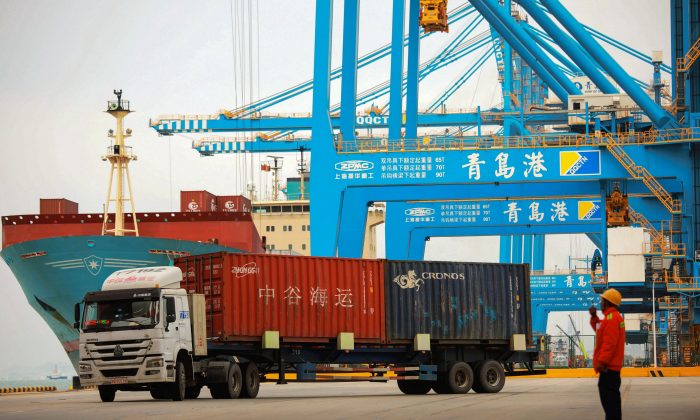A staff member watches over a truck as he talks on his interphone at a port in Qingdao City, Shandong Province, China, on November 8, 2018. STR/AFP/Getty Images
China Moving to Target US Companies
Tactic could be used to leverage business leaders to pressure U.S. government
June 9, 2019
Commentary
Ford Motor Co.’s joint venture in China was fined by Beijing for antitrust violations, in what appears to be heightened scrutiny into and retaliation against U.S. companies by Chinese authorities.
The fine levied against the Dearborn, Mich.-based automaker is the latest in a string of punitive actions towards American companies in an increasingly tense trade standoff between the United States and China.
Beijing’s motives could be two-fold. One is to retaliate against the Trump administration’s sanctions on Chinese telecommunications giant Huawei. The other goal is to put pressure on U.S. companies operating in China to appeal to the Trump administration for reducing or dropping ongoing tariffsagainst Chinese imports.
Fines and Investigations
Chang’an Ford Automobile Co. was fined 162.8 million yuan, or approximately $23 million, by authorities for allegedly restricting retail sale prices since 2013. The fine was disclosed by the State Administration for Market Regulation’s website.
Chang’an is a joint venture between Ford and Chongqing Chang’an Automobile. Its sales have slipped since late 2017 as the Chinese auto market is in the midst of a slowdown.
While the penalty levied was small, it does signal a new way Beijing may be retaliating against the United States amidst the trade war.
The decision to fine Ford came mere days after Beijing authorities said they would investigate U.S. logistics giant FedEx Corp. for “wrongful delivery of packages,” according to Chinese state media. FedEx had come under fire after Huawei alleged that the courier had diverted several packages destined for the company’s Asia offices.
Two FedEx packages sent to Huawei offices were diverted to the United States, according to a Reuters report. FedEx had since said they were “misrouted in error.”
Chinese Communist Party officials in early June signaled that Beijing would draw up a list of “unreliable entities” to include firms that it concludes are untrustworthy and may harm its interests. With regards to FedEx, Chinese state broadcaster CCTV said it was a warning against U.S. companies while state media Xinhua specifically used two very telling hashtags of #ChinaUSTrade and #RetaliateAgainstUSTradeBullying in its related reports on social media platform Weibo.
Three Likely Strategies by Beijing
Besides the Ford fine, which was minimal, few tangible, material punishments have been doled out to U.S. companies as of June 7.
But Beijing’s saber-drawing has nonetheless shaken investors and no doubt many U.S. companies with major operations in China are bracing for the possibility of retaliatory action.
There are three parallel paths Beijing could go down. One path is direct and involves putting U.S. firms on an “unreliable” list which would severely restrict their operations in China and dealings with Chinese firms. In practice, this could be similar to the restrictions the United States placed on Huawei last month, but likely would not include too many companies.
The second path is more akin to the actions that led to Ford’s fine. China may increase scrutiny against U.S. companies operating in China and levy punitive actions. More investigations could be forthcoming, over antitrust behavior, consumer safety, technical violations, and even political issues.
The third involves indirect retaliatory measures that could impact many U.S. companies. Beijing wouldn’t state specific punishments but would take more subtle measures to negatively impact the operations of U.S. companies. This could include actions such as limiting the travel of Chinese tourists, further restricting the outflows specifically to U.S. dollars, more biased rulings against U.S. companies in legal cases, and galvanizing nationalistic fervor to encourage consumer boycotts of U.S. brands. As an example, Nike Inc.—whose sportswear is extremely popular in China—could lose sponsorships and market share to local brands such as Anta Sports or Li-Ning in China.
Beijing will use these tactics not only to retaliate against the U.S. government, but also—because revenues, earnings, and commercial interests are on the line—as a means to pressure investors and management of U.S. companies into appealing to the Trump administration on its behalf.

No comments:
Post a Comment
Comments always welcome!